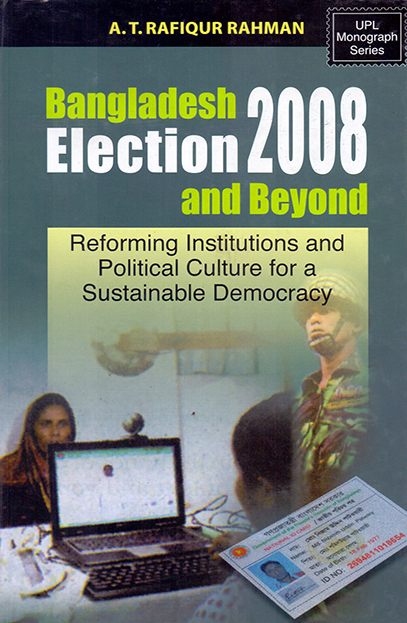- Shop
- Bangladesh Election 2008 and Beyond: Reforming Institutions and Political Culture for a Sustainable Democracy
Bangladesh Election 2008 and Beyond: Reforming Institutions and Political Culture for a Sustainable Democracy
https://uplbooks.com/shop/9789840518029-bangladesh-election-2008-and-beyond-reforming-institutions-and-political-culture-for-a-sustainable-democracy-11873 https://uplbooks.com/web/image/product.template/11873/image_1920?unique=b656810
| Language: English |
Tags :
Book Info
Reforming political and governance institutions is not a common issue during election time. The last time this issue dominated an election campaign in a first world country was in the early eighties with Margaret Thatcher in Great Britain and Ronald Reagan in the United States. Thirty-six years after its birth, a Bangladesh caretaker government is facing the same issue. They are addressing it directly by instituting some useful reforms. Bangladesh Election 2008 and Beyond focuses on the importance of reform and the need for the next elected government to stay committed to this approach as well as explore it further. Successfully addressing these key institutional reforms will be crucial in helping Bangladesh and its citizens reach their full potential. The book briefly reviews the on-going reforms and argues that they cannot be sustained without necessary additional reforms some of which will require amendments to the Constitution. The author strongly recommends that only an elected government should undertake these reforms. While the caretaker government need to focus on elections, on-going reforms and the economy, its role in the additional reforms should be that of a facilitator, more specifically: (1) identifying major areas of additional reforms; (2) organising committees/ commissions with strict timetables and proper logistical support; and (3) encouraging constituents to develop actionable proposals for additional reforms for consideration by political parties. The book identifies three main areas of reform: (1) effective working of the Parliament and its committees; (2) meaningful deregulation of the government and the creation of compact ministries; and (3) establishing labour peace and controlling the Andolans: two necessary prerequisites for sustained economic development. In essence, the author believes the debate and development of practicable reform proposals in these areas will provide the necessary bridge between the current caretaker government and the next elected government. The book also emphasises that the success of these reforms go hand in hand with shifts in political culture to align the country's democratic values and practices with its political behaviours and actions. The author recommends specific measures towards reforming political culture and offers some concrete strategies on modalities and timing of reform. Finally, the book emphasises that stability is the foundation to sustained development without which Bangladesh may not be able to realise its full potential.

A.T. Rafiqur Rahman
A. T. Rafiqur Rahman received his PhD. in political science from Duke University, USA, and spent fifty years in teaching in Dhaka University, Carleton University, Canada, City University of New York and managing development programs in Comilla Rural Development Academy, International Development Research Center, Canada and United Nations Secretariat, New York. He conceived and led three UN studies in Bangladesh in the 1990s on public administration sector, local governance, and human security, which were published and critically acclaimed. The author published many articles and books in his profession. His two latest books are: Bangladesh in the Mirror: An Outsider Perspective on a Struggling Democracy, and Bangladesh Election 2008 and Beyond, both published by UPL in 2006 and 2008



